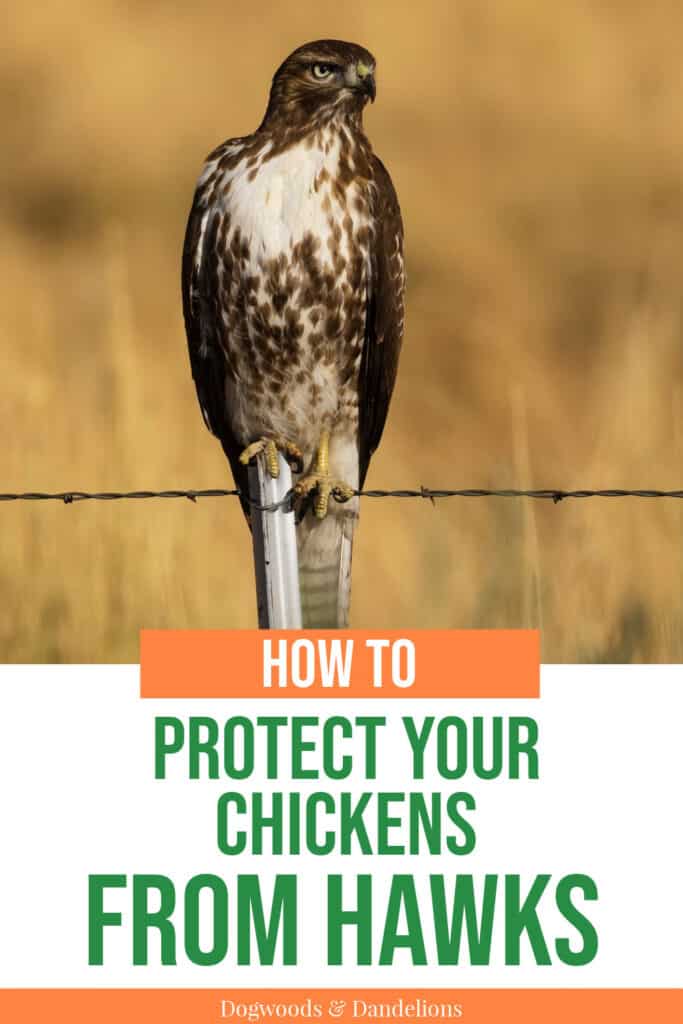How to Protect Your Chickens From Hawks
Inside: Hawks are one of the most common chicken predators. Learn how to protect your chickens from hawks in this post.
We have a tree on the south side of our chicken coop. It is a great way to provide shade for our flock during the summer. However, we’ve had quite a few hawks perch there watching our flock and waiting for an opportunity to snatch one.
We’ve even seen a hawk sitting on top of our covered run, probably trying to figure out how to get inside. We also regularly see a red-tailed hawk sitting on the powerline in front of our house, looking across our hayfield for rats and mice. He’s such a frequent visitor we even nicknamed him Harry.
And just today, as I was outside in the garden taking a break from working on this article, a hawk swooped down between me and our chicken coop. It was less than 20 feet away!
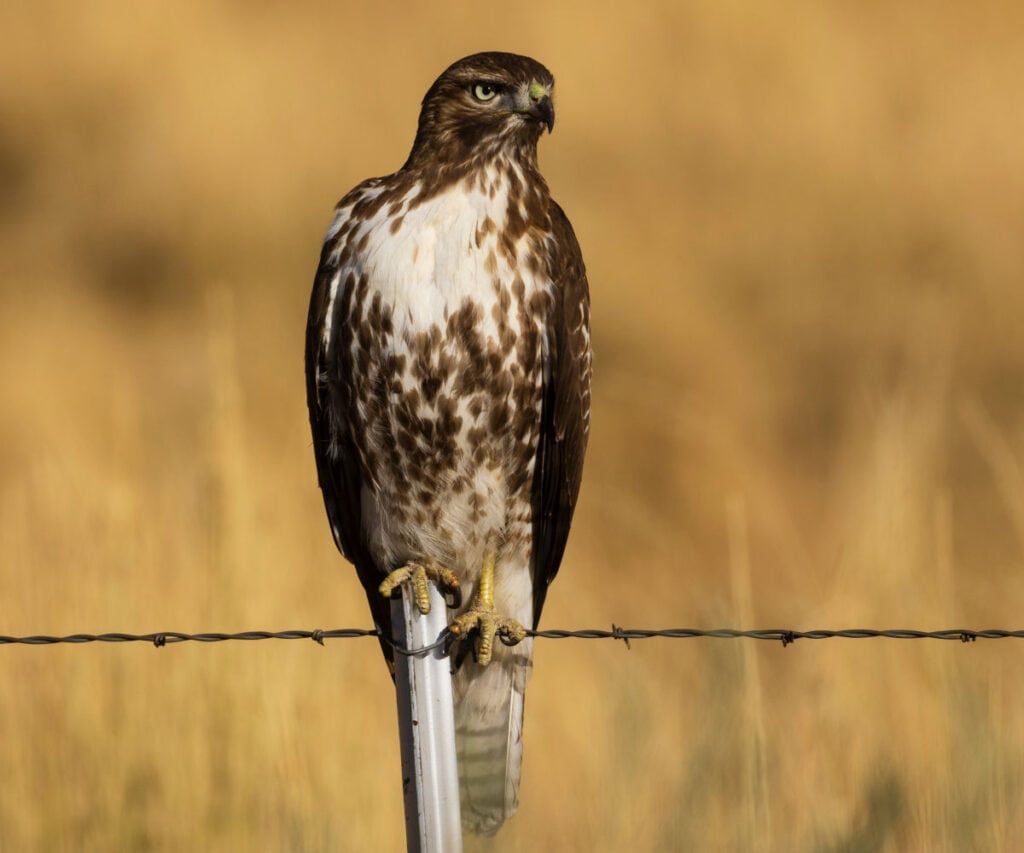
Hawks Can Be a Threat to Chickens
Many people don’t realize the danger a hawk can pose to your flock. While sometimes, it’s true that the hawks are smaller than your chickens, that doesn’t mean they won’t try to snatch one.
Young chickens, baby chicks, bantam breeds, and game hens are especially vulnerable to a hawk attack because of their smaller size. But even full-grown chickens can be at risk.
And unfortunately, if a hawk attacks a chicken and doesn’t kill it, it can still severely injure a chicken to the point that it might need to be put down. The sharp talons on hawks can rip a chicken’s back open in an instant.
Just because you don’t live in a rural area, don’t think hawks aren’t a threat. Surprisingly, hawks will make a nest in almost any tree. And sometimes they will make nests on other tall objects such as electric transmission poles and cell phone towers.
Hawks do serve an important role in the ecosystem. Their keen eyesight means they are great hunters of rodents and small animals in open fields. Hawks attack the small critters that eat and destroy food crops so they help to keep those populations in check.
It Is Illegal to Kill or Injure Hawks
Keep in mind that in the United States, it is illegal to kill or injure a hawk. They are protected by both state and federal laws (The Migratory Bird Treaty Act).
From the research I’ve done, you cannot harm or kill a hawk, even if it is attacking your flock unless you have a depredation permit. (A special permit issued by the Department of Interior U.S. Fish and Wildlife Service to allow you to kill federally protected birds.)
Not sure what a hawk looks like? You can see a picture of a red-tailed hawk on the North Carolina Wildlife Service’s page. Red-tailed hawks are found throughout the United States and are the most common hawk in North America.
Pictures of another common hawk, the Cooper’s hawk can be found here.
Since you can’t kill or harm hawks, let’s look at some ways you can deter them from attacking your flock in the first place.
Affiliate Disclosure: Please note that some of the links in this article may be affiliate links and I may receive a small commission if you purchase something through a link. It will not change your cost. As an Amazon Associate, I earn from qualifying purchases. For more information, see my disclosures page.)
Ways to Protect Your Chickens From Hawks
If you have free-range chickens, you want to keep them as safe as possible. Allowing them to roam in an open area means they are very susceptible to a hawk attack. These ideas are some ways to protect your flock from a hungry hawk.
Use Fake Owls as a Deterrent
Strategically placing a fake owl near your chickens can help to deter hawks. Both species are birds of prey, but they tend to want to leave each other alone. So usually a hawk will move on if he spots an owl nearby.
The one caveat of using an owl decoy as a deterrent is that you need to regularly move the owl around. Hawks are quite smart so they will eventually realize that the fake owl isn’t real if he is sitting in the same spot day after day after day.
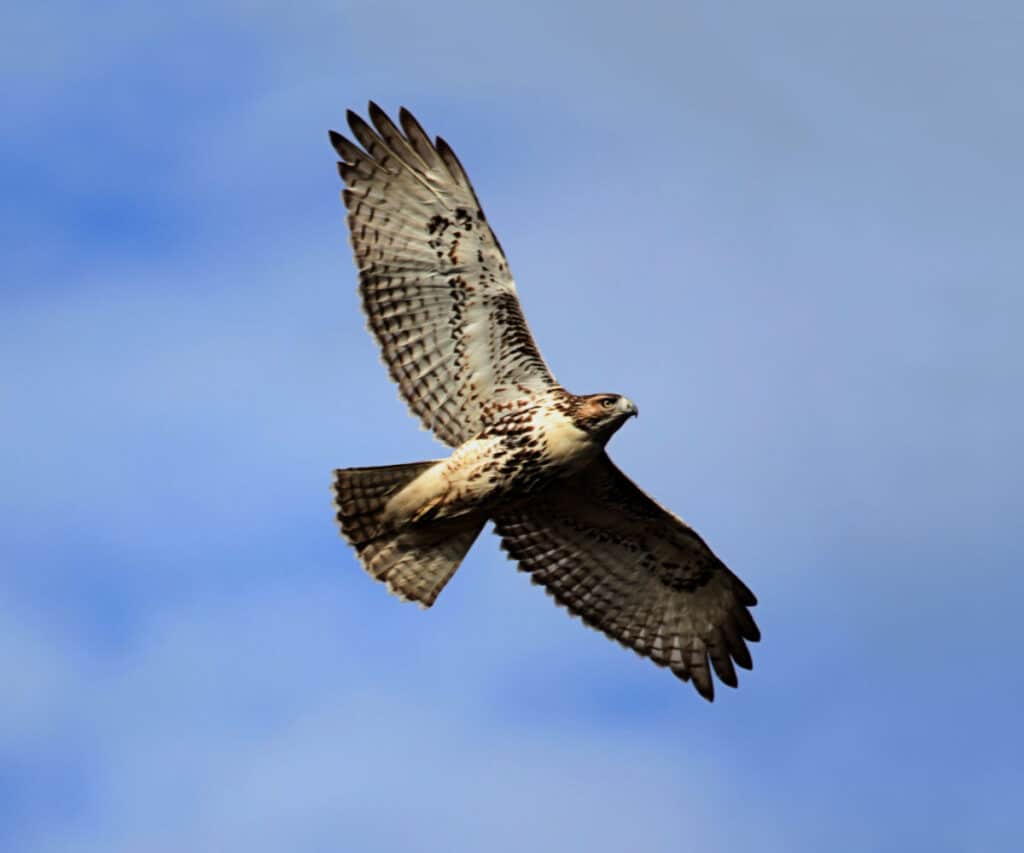
Cover the Run with Fishing Line
One inexpensive idea I’ve seen to keep hawks out of a chicken run is to crisscross fishing line across the top of the run in a diamond pattern. If the hawk tries to swoop down and grab a chicken, he will get caught by the network of fishing line and fly away.
The one downside to this method is if a hawk were to get trapped in the fishing line. Then you have to get him free without injuring or killing him. (See the point at the beginning of this post about hawks being federally protected birds.)
Shiny Objects
Many people use shiny objects to keep hawks away from their chickens. Aluminum pie pans, old CDs, and reflective tape can all be put up around the area your chickens free-range to help deter hawks.
Of course, these aren’t foolproof and after a while, a hawk may come to realize that these objects aren’t really a threat at all.
Blinking Lights
Blinking lights can also help to deter hawks, though they aren’t as effective to deter daytime predators like hawks as they are to deter nighttime predatory birds like owls. You can purchase solar-powered lights like the Niteguard Solar Protector to help keep your flock safe.
Using a Guard Dog
A guard dog can often keep hawks away from your chickens. Oftentimes a hawk won’t take a chance on trying to grab a chicken if a dog is nearby.
But if the guard dog is not a livestock guardian dog trained to protect your flock, it can do more harm than good. I’ve heard of many dogs killing chickens just for sport.
So, if you are going to use a guard dog to keep your flock safe, make sure it is properly trained.
Let Your Flock Free Range with Other Animals
Allowing large animals to free range with your flock may help deter hawks also. Animals such as goats, horses, cows, or donkeys can help keep the hawks away.
The presence of a large animal is often enough to make a hawk decide it’s not worth the risk for a chicken dinner.
While this is obviously not a practical solution for many backyard chicken keepers, I did want to mention it for those who have a bit more land and already have some other farm animals.
Keep Some Black Chickens
One enemy of hawks is crows. Crows will harass hawks because they realize the hawks will eat their eggs and their baby chicks. We often see hawks flying in the air and a few crows diving towards the hawks.
Some people have said that keeping a few black chickens can help keep hawks away because they think they might be crows.
I’m not sure how well this would work, but I do know that white chickens make easy prey for aerial predators since they are easier to spot against green grass or brown fields. So if you are sure you are going to free-range your flock, you may want to choose black chicken breeds instead of white ones.
Keep a Rooster
Sometimes having a rooster with your flock will be enough to keep a hawk away from your chickens. While keeping a rooster is definitely not a guarantee that a hawk won’t attack your flock, a rooster’s size can help deter hawks.
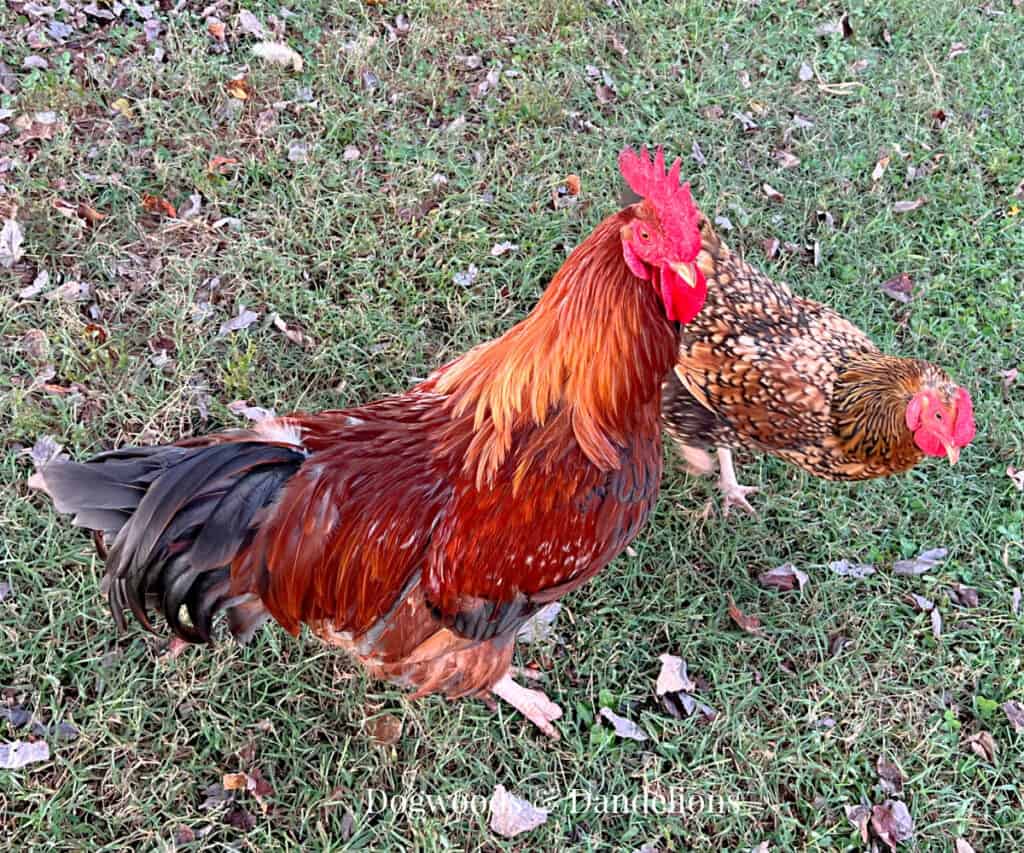
Hawks generally prefer to swoop in, grab an animal, and fly away with it. With roosters generally weighing more this makes stealing a chicken more difficult for the hawk.
A good rooster will be alert while his hens are out free-ranging. He will sound the alarm for the entire flock if he sees or hears danger. And that danger includes hawks. A good rooster can easily be worth the money it costs to feed him if he keeps the flock safe.
While I’ve been fortunate not to have to see the horrible sight myself, I have heard of roosters tearing hawks apart with their sharp spurs. And while that isn’t ideal, because a rooster can be injured as well, rooster do provide some measure of protection for your flock against a hawk attack.
Provide a Safe Space for Your Flock to Escape
If you do allow your chickens to free range, providing a cover they can run under can help to keep them safe. Hawks typically swoop down and snatch their prey.
If the chickens can get under cover, the hawk won’t be able to grab one and fly off. That’s not to say a hawk won’t necessarily attack and kill a chicken in your chicken yard. But they prefer to grab their meal on the go.
A few low bushes in your free-range area will give your flock somewhere to escape to. If that isn’t an option, you can even build a low structure with a roof so that your chickens have a safe area to flee to in the event they see a hawk.
Build a Secure Coop & Run
Building a secure chicken coop and run is the safest way to ensure a hawk doesn’t get one of your chickens.
To keep hawks away from your chickens you should be sure to totally enclose your run with wire. Using chicken wire to cover the top of the run is one of the few places I can recommend that is a good use for chicken wire.
And only if you lock your flock in the coop each night. Chicken wire will not keep a hungry raccoon out. So if raccoons are a problem and you aren’t going to lock your birds up at night in the coop, use hardware cloth or 2-inch by 3-inch welded wire.
Use a Chicken Tractor
Using a chicken tractor is probably the best way to keep your flock safe from a hawk attack. While this is technically not considered free-ranging, a mobile chicken coop allows your flock access to grass and bugs while keeping your chickens secure.
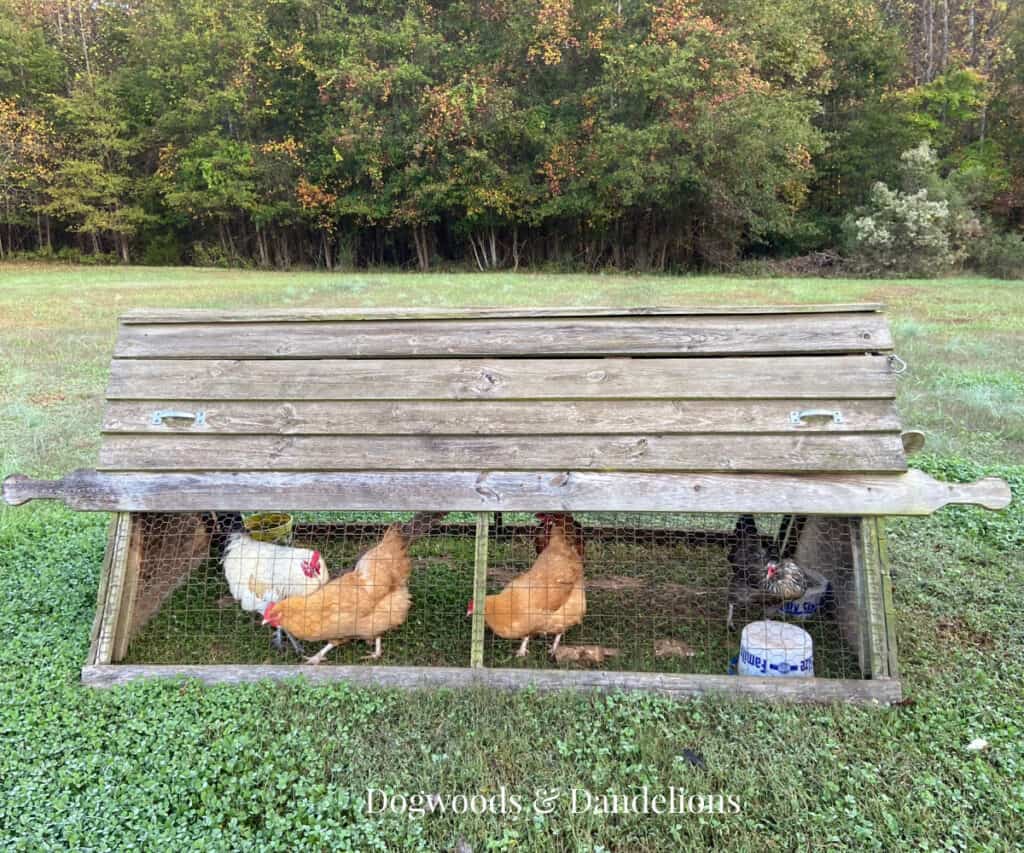
If there is a foolproof way to keep your chickens safe, using a chicken tractor is probably it.
As chicken keepers, it is our responsibility to protect our flocks. Use these tips to keep hawks away from your backyard chickens.
Related Posts
- Common Chicken Predators you need to be aware of.
- Benefits of Free-Ranging Your Chickens
- Do You Need a Rooster in Your Flock?

Meet Julie
I’m a farm girl born and bred in North Carolina. I’ve been growing a vegetable garden for over 20 years (and helping my Mom grow hers even longer). I’ve been raising chickens in my bathtub and backyard for 12+ years. I believe that homegrown food can be made simple. Let’s get started.
